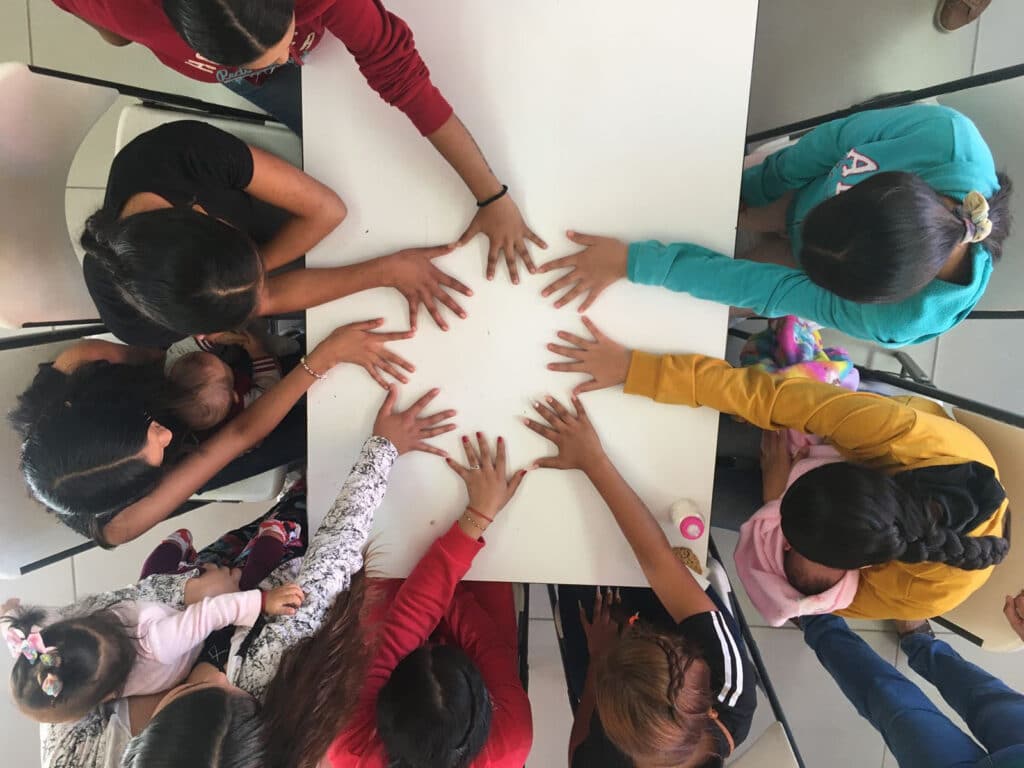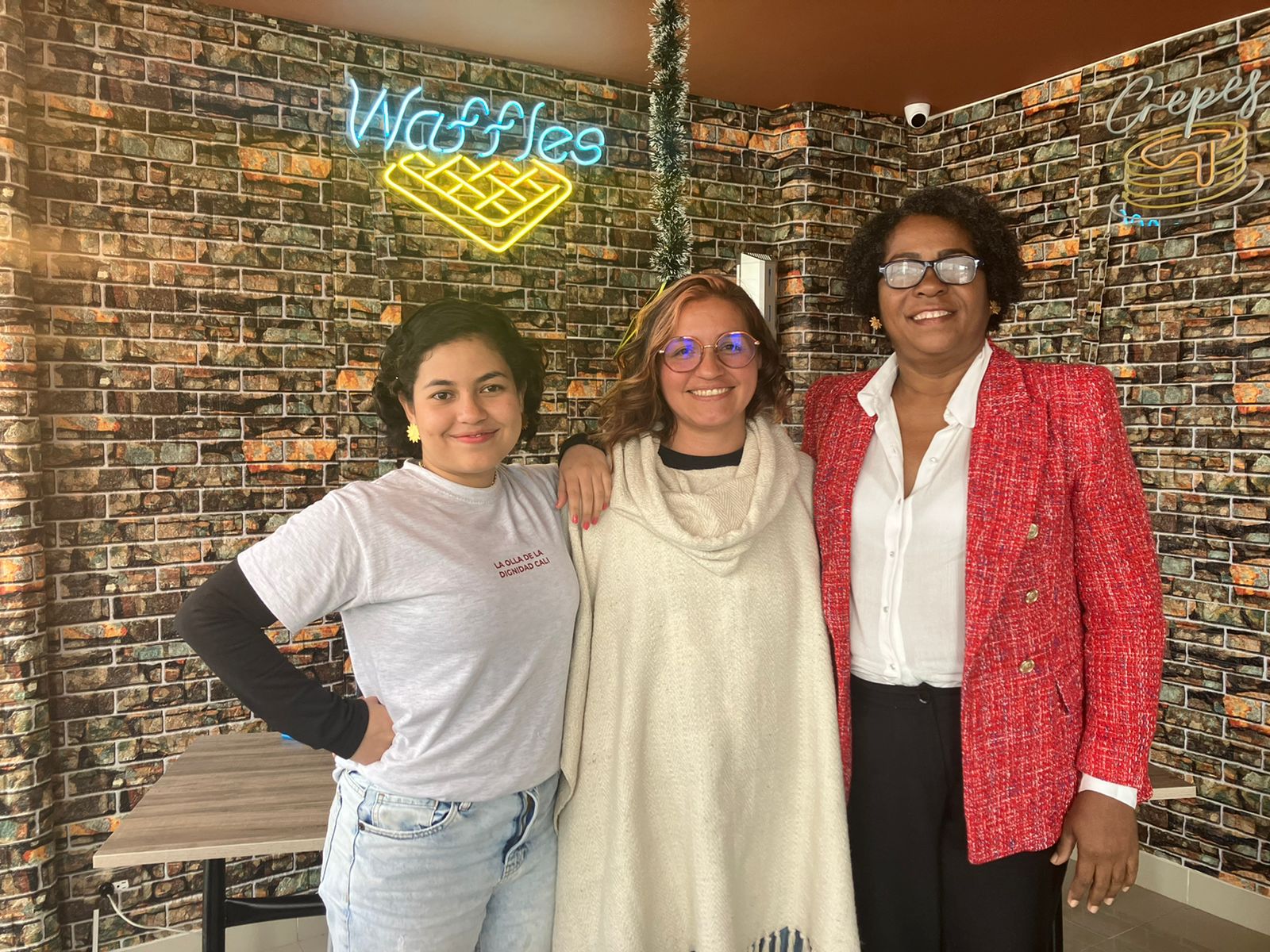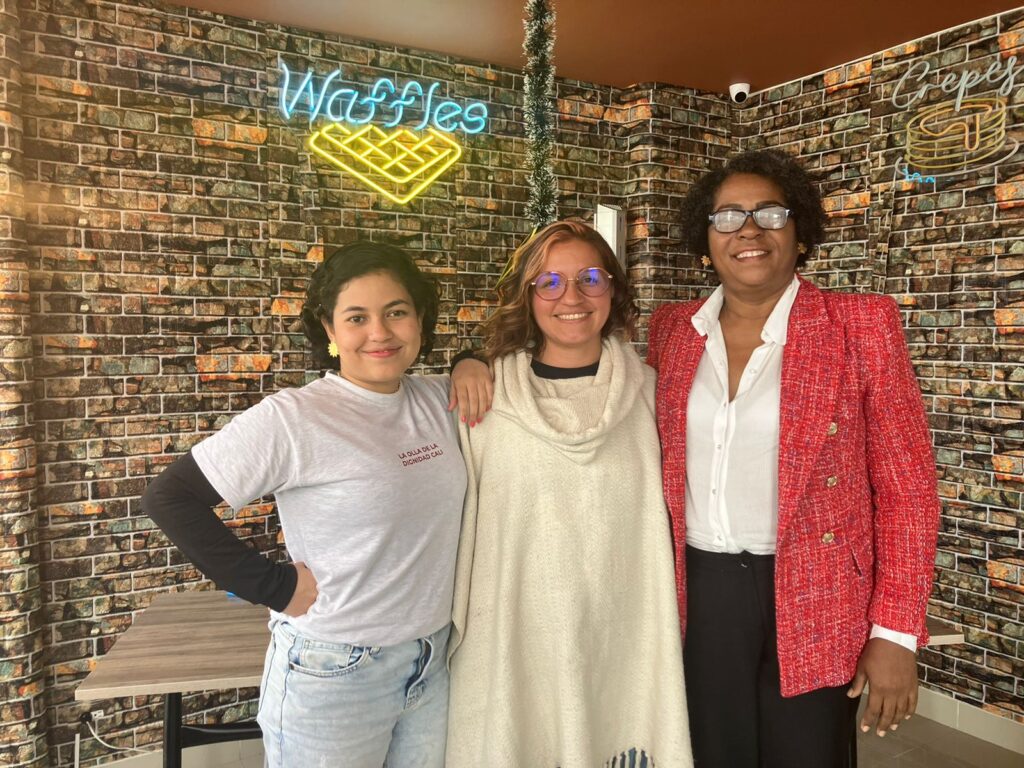Celebrating the Graduation of the 2022 Goldin Global Fellows Spanish Cohort
Creating an accessible leadership program for Spanish-speaking grassroots leaders

On December 10th we celebrated the graduation of the first Goldin Global Fellows program in Spanish language, where 17 Spanish-speaking grassroots leaders from eight countries in Latin America and Europe came together to create a new community of practice.
Since 2018, we've held onto the dream of offering the Fellows program in Spanish. True to Goldin Institute’s principles of ensuring that resources and connections are accessible to as many grassroots communities around the world as possible, offering the program in Spanish has long a priority for our whole team. Removing language barriers -- which included translating the curriculum, readings and videos in the GATHER Platform from English to Spanish -- was not an easy process. But I can say the effort to offer this course in Spanish has been worthwhile, especially for me as a Spanish-speaking activist who has been able to find a community who speaks in my native tongue and who are also working on both similar and different issues.
“Gather is knowledge and collective construction.” -- Luis Alomia, Colombia
During the recruitment process we counted on our Alumni, friends and colleagues from Colombia and Latin American countries to help us share the news of the application and spread the word. We were delighted to receive applications from a diverse group of grassroots leaders from over 10 countries that crossed many divides in our society, bring together youth and elders, leaders from rural places and main cities, victims of violence and former combatants. Together, these individuals represented a wide range of sectors, including environment, law, education, technology, peace and reconciliation, arts, memory, sports, theater, and more.
“Gather is a before and after of my leadership. I am happy since they contributed to broaden my vision and knowledge that will help me to build solutions that can be lasting over time and see communities as a treasure of active resources and that will be an example of good practices for other communities that want to join the transformation”. -- Natasha Duque Torres, Venezuela
It was truly a very diverse group, each doing beautiful work individually, but tied together by the common bond of being leaders on the front lines where life revolves around changing their communities and finding solutions every day. From these applicants, we selected 17 individuals who became the first Spanish-speaking cohort.
As a facilitator I was impressed when talking with our Fellows about the learnings and concepts delivered in the program, and realized how their perspectives and ideas about their community and social-change work had begun to develop and adapt. Indeed, they became more aware that new solutions had to be based on all the assets they always had but may not have seen in their communities. It was also moving to see how they started imaging a new understanding of leadership which counts on the whole community, giving opportunities to those often left behind. I was further impressed at how sensitive they became; in our conversations we sometimes cried noticing the changes they were going through and how new concepts gave them a vision of collectiveness.
"Gather has allowed me to broaden my horizons as a social leader by identifying and valuing resources and assets that we have as a community, as well as empowering the leadership of my colleagues based on the recognition of their individual strengths and interests in community work." -- Diana Rocio Gomez Torres, Argentina
Fellows felt that the course on the GATHER Platform was different from other courses because they had a strong sense of support from the Goldin Institute team and meaningful relationships with their peers.
It’s like a family that we can always count on, no matter what.
In our roundtable “Reflections and Critical Moments” one of the most broadly shared reflection was that the Fellows felt like they were not alone in this program, knowing there were other leaders around the world doing the same and learning alongside them. For example, Ernst from Haiti would tell us about the challenging times facing the Haitian population due to the political situation in his country, or Eva in Argentina would share that she faced many struggles for raising her voice against state violence. We also exchanged positive and happy stories too, for example Manuella shared about her journey from Quibdo (Colombia) to Spain to talk about how successful her project about football was there, or Nuria from México who got to be involved in a project to protect underage pregnant girls. We also had Martha from Guapi (Colombia) who graduated from her specialization during the Fellows program and Arturo from Bogota (Colombia) and his “Picaditos” Football matches with youth when they launched their book “La Prisión que Jamás me Contuvo” written by a former combatant. All of us looked forward to meeting each Saturday where we shared beautiful moments with each other during our weekly GATHER Roundtables.
“Gather is a seedbed in which the strengths, abilities and natural gifts of leaderships are brought out.” -- Geiner Arrieta, Colombia
So when the Program came to an end, Fellows wanted their graduation to be like a party; a celebration of life, cultures, learnings, our individuality and how this makes sense in community. Fellows celebrated with drinks from their territories, showing off their typical customs or any other item that represented them. We also had a freestyle performance by Johnathan, and a video of some musicians and dancers from the region where one of our youngest fellows, Luis Alomia, is from.
“My Gather experience has helped me to see that the actor of change that I want to be requires the participation of everyone in my community. Having grown up in a society where exclusion is the norm, Goldin has given me the necessary tools to be a true agent of change by collaborating with others and identifying our resources to be able to dream big together”. -- Ernst Djeride, Haiti
I have to say the best part of the celebration was the desire of Fellows to talk about the future and their optimism for new collective projects. They want to move forward, grow, and build together. Fellows Manuela and Arturo proposed four lines of work for Fellows in 2023:
-
- Creating a shared asset map with the purpose to realize a meeting of sharing vision. To have it real, we need a plan to know what we have, what can we do to meet us face to face together and develop our community visioning summit.
- Monthly meetings where each person of this cohort can lead one of the meetings.
- A directory of all the members of the Alumni network with their strengths and special topics and projects where they work.
- Participate in all the workshops set up by the Goldin Institute so we can learn, meeting new people and collaborate in new projects.
- We can share our networks, follow each other, and get to know what each one is doing, as well as and distribute what others are doing, including Goldin Institute’s social networks.
- We need help from the Goldin Institute to present our projects in case we need representation.
"Gather has given me the chance to meet my community again, open up to new listening, in order to collaborate on the paths we are charting together”. -- Nora Gabriela Fuentealba Rivas, Chile
And now, Fellows faithful to the principles they learned during the Goldin Global Fellows program wanted to remove barriers of distance so some of them made the efforts to meet with each other in person!
“As you may know this is the 20th birthday of Goldin Institute and I can’t think of a better way to celebrate our 20th anniversary than by welcoming you into our Global Family, congratulations to all of our new graduates on behalf of the Goldin Institute, and especially, on behalf of Diane Goldin, the Founder and Board chair of the organization.” - Travis Rejman, Executive Director of the Goldin Institute
This Week in GI History: Manresa, Spain
This week we mark the anniversary of one of the Institute's defining events: the 2003 Building Social Cohesion in the Midst of Diversity and Migration conference held in Manresa, Spain.
At that Event, community leaders from over 20 cities gathered to explore best practices from their practical experiences building social cohesion. The Conference came together over the central questions of:
- How do we promote a positive view of difference and build a sense of social cohesion in the midst of diversity?
- Where have people been effective at building relationships of trust, understanding and cooperation between diverse communities?
- How can we best learn from those communities that have successfully built trust amongst their diverse communities?
The collaborative learning, strategies and conversations at the Event provided tools for participants to bring solutions back to their respective cities. To find out more on how this was accomplished, view the full report on our findings of the conference. here.
Thirteen years have passed since the Manresa Event, but the issue of how communities in sizable cities overcome the division and tensions often caused by their diverse populations, remains as relevant as it was in 2003. In many ways, we were fortunate to make the connections with a group of talented and committed leaders willing to address the issue head-on, as it has proven to be prescient and set the tone for future project work.
[slide][img path="images/2003___17.jpg"] Goldin Institute co-founder Diane Goldin with participants at the 2003 Maresa, Spain Event. [/img] [/slide]
This Week in GI History and Building on a Key Past Event
This week we mark the anniversary of one of the Institute's defining events: the 2003 Building Social Cohesion in the Midst of Diversity and Migration conference held in Manresa, Spain.
At that Event, community leaders from over 20 cities gathered to explore best practices from their practical experiences building social cohesion. The Conference came together over the central questions of:
- How do we promote a positive view of difference and build a sense of social cohesion in the midst of diversity?
- Where have people been effective at building relationships of trust, understanding and cooperation between diverse communities?
- How can we best learn from those communities that have successfully built trust amongst their diverse communities?
The collaborative learning, strategies and conversations at the Event provided tools for participants to bring solutions back to their respective cities. To find out more on how this was accomplished, view the full report on our findings of the conference. here.
In the time since we held the Manresa Event, the issue of how communities in sizable cities overcome the division and tensions often caused by their diverse populations, remains as relevant as it was in 2003. In many ways, we were fortunate to make the connections with a group of talented and committed leaders willing to address the issue head-on, as it has proven to be prescient and set the tone for future project work.
Which brings us to new events and the ways in which we continue to honor our mission, and honor those we work with dedicated to bringing social cohesion to their communities. This week, two of our associates from Chicago, Alexis Smyser and Srishtee Dear, are in attendance with our colleagues in Colombia at the Foundation for Reconciliation conference in Bogota. Here, participants from several countries review and reinforce the key principals of the ESPERE methods that the Foundation has been refining since first introducing in 2007.
The ESPERE methodology is engaging new community leaders, former child soldiers and educators in the proven concepts of reconciliation and forgiveness. What began as a grassroots project by Fr. Leonel and his team in Bogota less than a decade ago has now flourished to see participation throughout North and South America and recently to Africa. Partners of the Goldin Institute in Uganda have taken up the ESPERE methodology and have used is as a powerful tool in the reintegration for former child soldiers.
[hl bg="#d07000" fg="#ffffff"]Continue to follow us as we share new learnings and outcomes from this latest conference in Bogota. See how the common theme of social cohesion that began 12 years ago in Manresa is alive and well and being proven highly adaptive in new environments and by new leaders bringing positive change to their communities.[/hl]
[slide][img path="images/2003___17.jpg"] Goldin Institute co-founder Diane Goldin with participants at the 2003 Maresa, Spain Event. [/img] [/slide]


